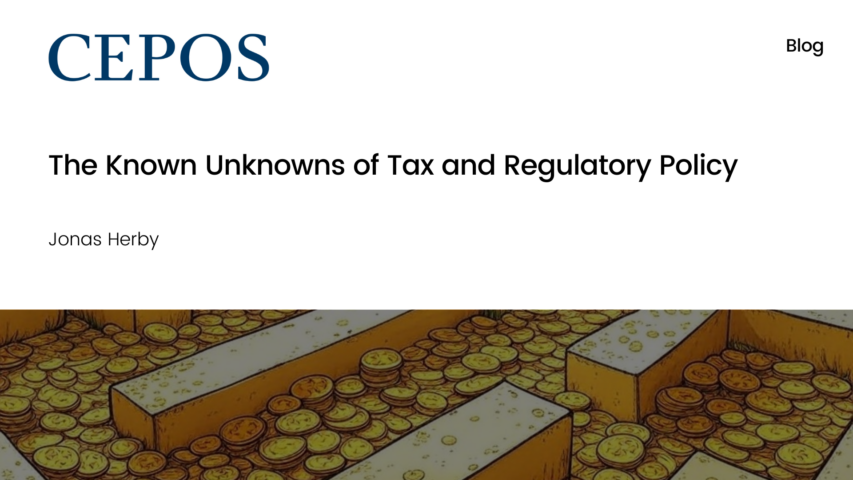The Known Unknowns of Tax and Regulatory Policy

The Known Unknowns of Tax and Regulatory Policy
Jonas Herby // 5 July 2022
“We can see that it works” is oftentimes the argument adopted by politicians and NGOs to justify why Danes’ choices must be governed through regulation and taxes. There are numerous examples of such thinking: Levying higher taxes on cigarettes is effective because it lowers the number of smokers. Regulation works because it limits the number of payday loans.
Nonetheless, does a political initiative work simply because it affects the behaviour of the population? Should a good policy not be defined by it’s ability to create a better society? Let me use the high taxes on cigarettes in Denmark – which several politicians and NGOs support and advocate for – as an example.
We have a publicly funded and managed healthcare system in Denmark; therefore, one person’s consumption of tobacco leads to others having to pay for this person’s potential treatment in the future. Since citizens other than the smokers themselves end up paying for the cost of smoking, an economic argument can be made that taxes on cigarettes create a better society. However, the Danish Ministry of Taxation has calculated that the economically efficient price of cigarettes is approximately DKK 45 per package, which is significantly lesser than the approximately DKK 60 that a package costs today. We are thus far beyond the stage where higher taxes on cigarettes can create a better society based on an economic cost–benefit analysis.
Another commonly used argument for higher taxes is that if taxes can make people smoke less, it will categorically improve their lives. Even if one were to buy into this paternalistic argument – which implies that some citizens are unable to take proper care of their own lives – one is far from assured that higher taxes improve the lives of smokers. Maybe they just cut down on other (healthy) items in the budget. Maybe they switch to smuggled cigarettes or other forms of drug or substance intake such as alcohol, cannabis, etc. We know very, very little about how higher taxes on cigarettes affect the lives of smokers.
However, we do know that there are many reasons to believe that higher taxes actually harm smokers. First, higher taxes reduce smokers’ real incomes. Prices have increased by DKK 15–20 in recent years; although consumption has also fallen slightly, the total cost of cigarettes for smokers – many of whom have low incomes – has increased significantly. Second, the decline in consumption is not necessarily helpful to smokers addicted to cigarettes after lifelong consumption, who are likely to experience pain if tobacco consumption reduces or is completed eliminated.
The lack of insight into the consequences of regulation and taxes is unfortunately not isolated to smoking. The regulation of quick loans, nicotine products, and gambling is also permeated by uncertainty regarding the effects and consequences of regulation. We simply do not know whether the regulation of these products as a whole creates a better society, even from the point of view of the paternalists.
Yet, the debate is plagued by politicians and NGOs patting each other on the backs saying “It works!”
The orginal article was published by CEPOS in Danish.
EPICENTER publications and contributions from our member think tanks are designed to promote the discussion of economic issues and the role of markets in solving economic and social problems. As with all EPICENTER publications, the views expressed here are those of the author and not EPICENTER or its member think tanks (which have no corporate view).



